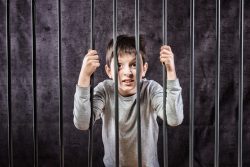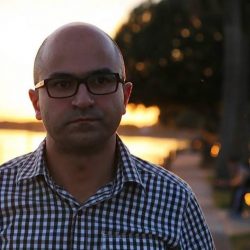Hament Farmand: Advocate and Storyteller

This is Julia with Prison: The Hidden Sentence ™ , and I’m at the 10th Annual International Prisoner’s Family Conference. I’m here with Hamed Farmand who is an advocate and storyteller. He is founder of Children of Imprisoned Parents International (COIPI). We had a nice opportunity to spend some time together and talk.
Listen to the interview:
(Edited for Readability)
Julia: Hamed, it’s so wonderful to be sitting here with you. Could you tell us a little bit more about what you do?

Hamed: Thank you so much for having me. It’s my pleasure. What I’m doing, as you said, is advocating for all children of incarcerated parents and storytelling about them with the community. I’m founder of a nonprofit organization, Children of Imprisoned Parents International. What I’m doing now is focusing on working with community members, engaging them to help us. There are many good organizations nationwide or in the world working to break the mass incarceration. They’re working on the effect of parents’ incarceration on children. But I believe that we need more support from community members. What I try to do is tell more stories about these children and help our community to have better understanding of what happened there and then how they can work and help us.
Julia: How do you reach out to the community?
Hamed: I have different ways. In the U.S., I started about four years ago founding my organization. Since then I have started to make a relationship with different local organizations and even community-based and faith-based organizations. There are many churches that do good work on working with the different families. So I met them and work with them. I had good friends to help me run my storytelling program, and then social media played a real huge role in this journey.
Julia: What I find so interesting is the storytelling. If you can tell us a little bit more about that because that’s something I think would be interesting to bring one of my groups too.
Hamed: First, I had a personal experience. My mom was in prison. So I started to write my memoir. I thought it’s a great tool for me to start telling a story that’s not just my story, it’s people all around the world. The other thing that I thought is if I want the community to be engaged, I can make a change on the way that I tell a story. So I started to make it as an interactive storytelling. I made a combination of art in a story. I have some ideas and I have an ongoing program. I had a painting and hang a story on that, and have a guideline for participants to read through the stories, look at that artist draw a picture of the child and the parents in both side of the art and in between the bars.
They can see that and read the stories and write their feelings about those stories and attach it to the bars. After a while they can see when they hear those stories, feel the bars, and reacted to that and fill a gap. So this is the message that I try to send to them and make a dialogue.
Julia: So the stories help them work through their feelings?
Hamed: The stories help them to understand the feelings – the feeling of the children.
Julia: That’s so cool.
Hamed: I try to give them understanding when we talk about the arrest, when they talk about Christmas Day without your parents, why they talk about going to school or playing with your playmates, or visitation, and coming back home to what we are talking about. What’s the feeling of those children and what do you do as a community member? Have you ever thought about this, that maybe your child playmates, your child classmates, your friends in your church if you’re going to church, or your neighbor, anybody … Or your student, if you’re a teacher, may have this experience and if you know what exactly they feel. What
my message is that then have them come and say, “Okay, what can I do?”
Julia: So it’s building empathy?
Hamed: That’s exactly what I try and the message of this conference caught my eyes. Okay, that’s what I’m trying to do, so let’s come and see what other people from the other states are doing about that.
Julia: So Hamed, where are you based?
Hamed: I live in Virginia, now in Reston, Virginia.
Julia: And that’s where your programs are?
Hamed: Most of my connection and relationship is there, yes. Fairfax, Alexandria, Arlington, more there, but I try to expand it.
Julia: If somebody wanted to learn more about what you’re doing, how would they contact you?
Hamed: Our website is https://coipi.org/: Children of Imprisoned Parents International. There’s a link to our social media, especially our Facebook has more shorter stories about what we are doing and the whole reports are on that site.
Julia: Okay, we’ll add that. What was the highlight of the conference? What do you think people would benefit from coming next year?
Hamed: For me, why I started researching about this, the impact of parental incarceration on children and the other organization who are working on this field, I started my research in 2012. But I see many new names here that I haven’t seen in my research. I also hear many good stories and connected to good practices, different ideas from people face-to-face that I haven’t found it online. So for me, it was a great chance to be with the group that’s not just professionals or experts, but also part of the families that’s working together to break the silence and make this bridge and go forward, support each other to see each other’s success.
For me, it was a great chance and I encourage everyone to want to do something, maybe support this group, send out their message, support them financially, or come together and see what else we do.
Julia: I agree. Thank you so much for your time and sharing about your mission: helping children of imprisoned parents.
Hamed: Thank you so much for all you’re doing.
For more information on the effects of children with incarcerated parents click here .

Jailaid says
The rights of children of incarcerated parents remain largely unacknowledged within criminal justice systems. Children fall through the cracks created by inadequate social welfare provision, lack of clarity in law and policy as to how to respond to them, and inadequate protection for children living in prisons. It is estimated that millions of children worldwide have a parent in prison: and an estimated 19,000 are living in prison with their parent, most often their mother, and many times that number are separated. Children are confronted with a host of challenges when a parent or caregiver is in conflict with the law.
Editor says
Thank you for reaching out to us and sharing information. In case you or anyone reading this would like more information, there are resources on the NIC website: https://nicic.gov/children-of-incarcerated-parents, the National Children of Incarcerated Parents Conference: https://childwellbeing.asu.edu/content/national-children-incarcerated-parents-conference, and the International Coalition for Children with Incarcerated Parents: https://inccip.org/.
globaltel says
Absolutely! Children are confronted with a host of challenges when a parent or caregiver is in conflict with the law.